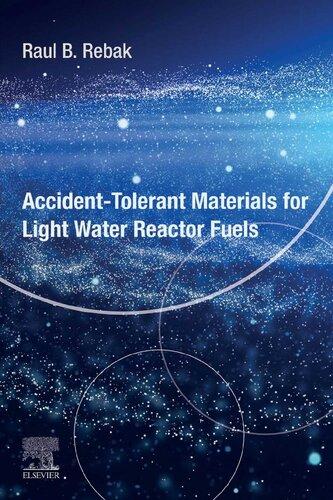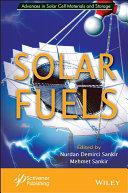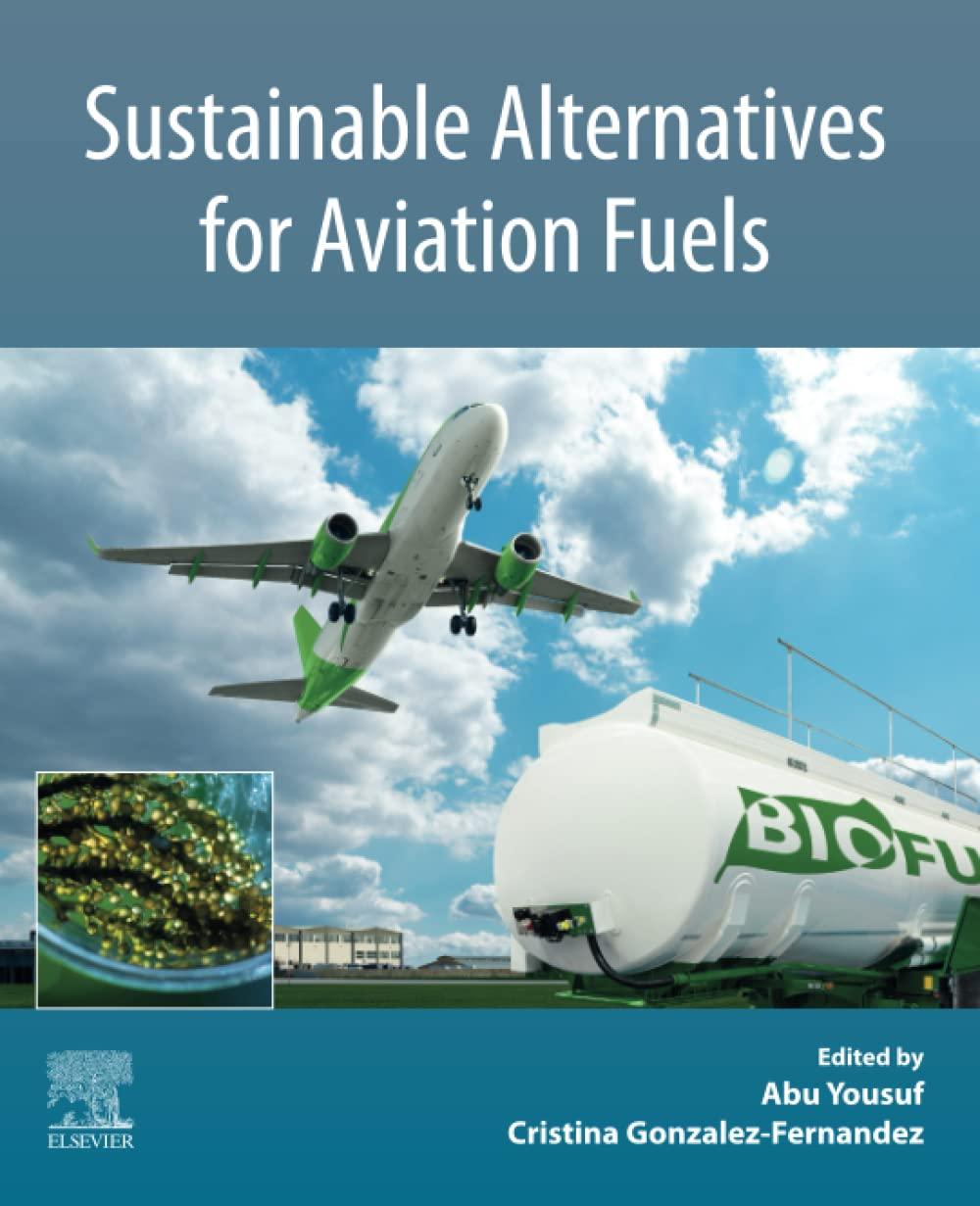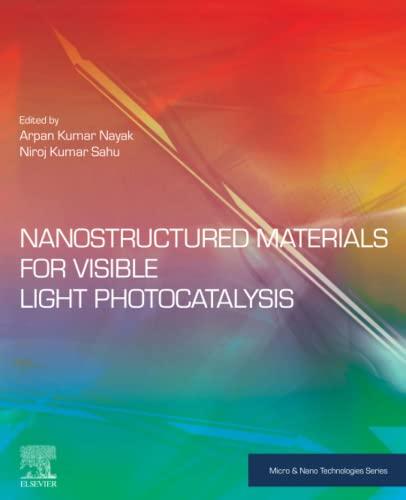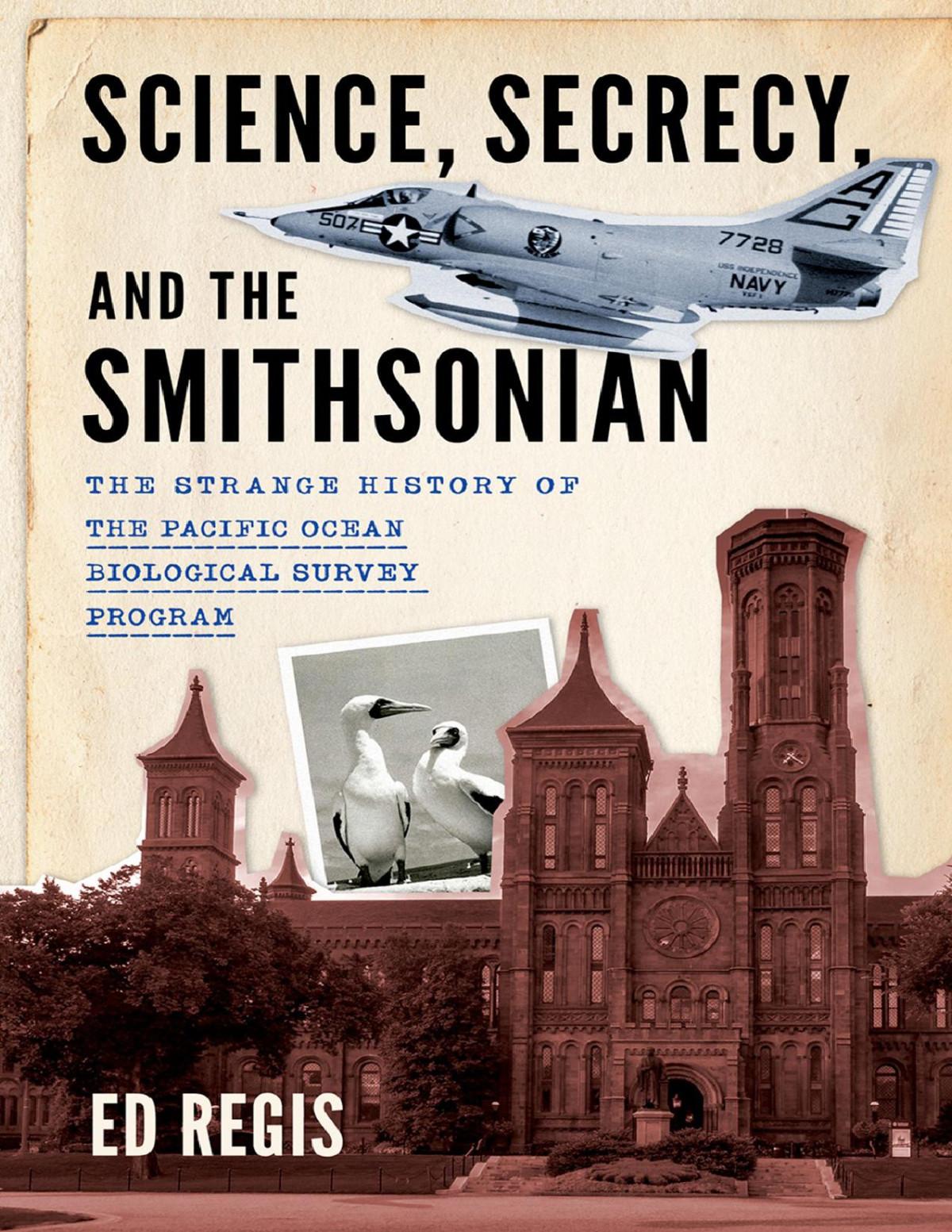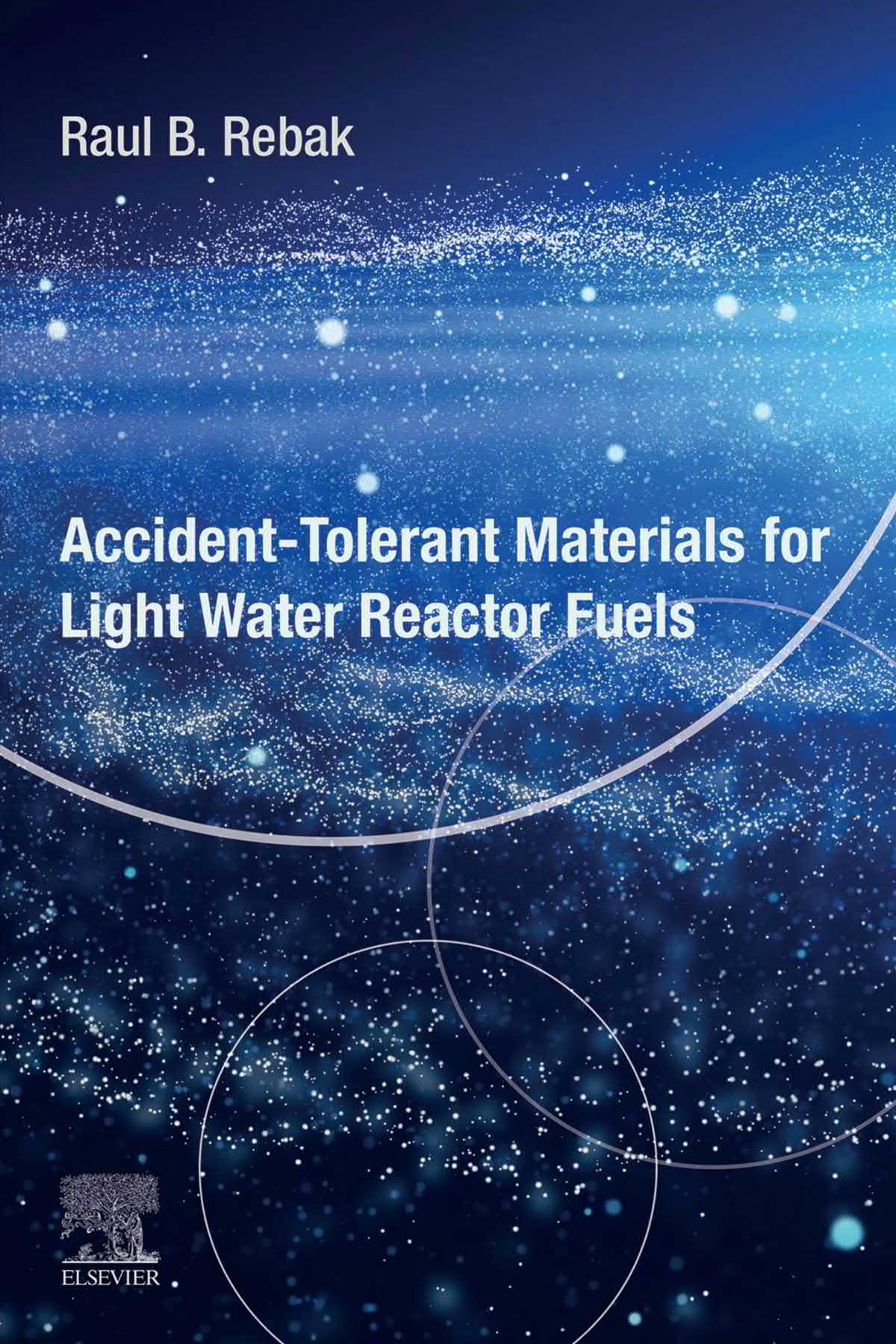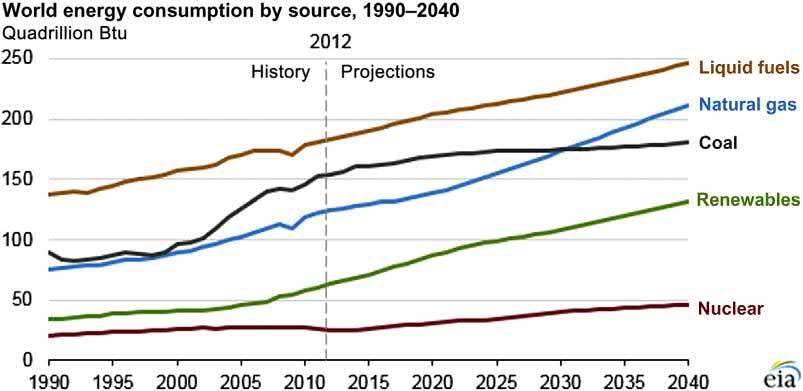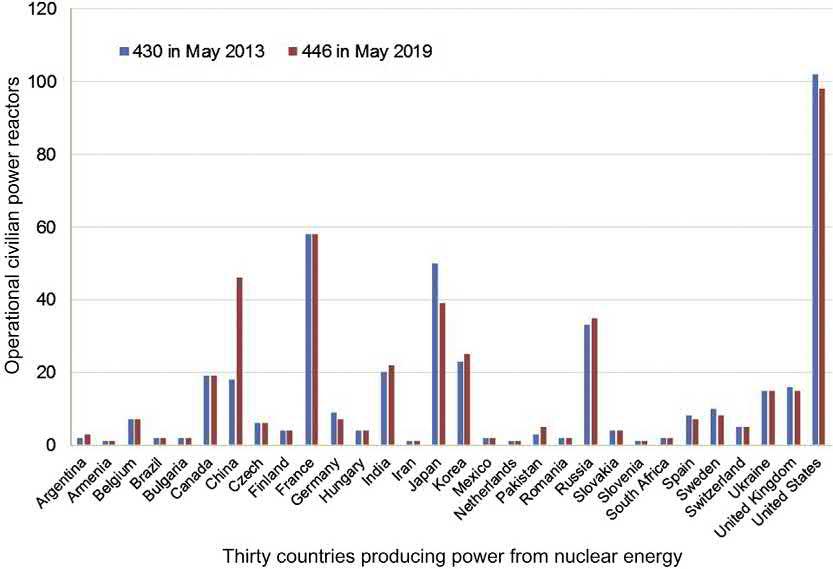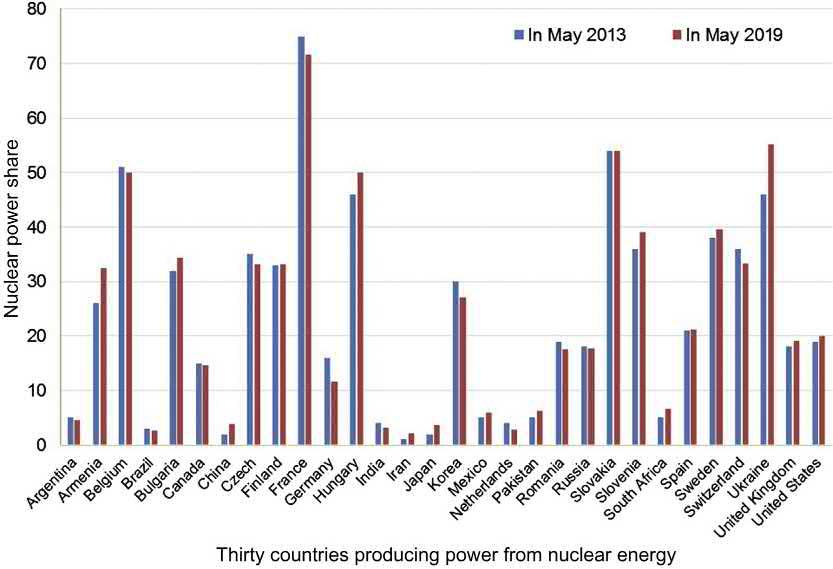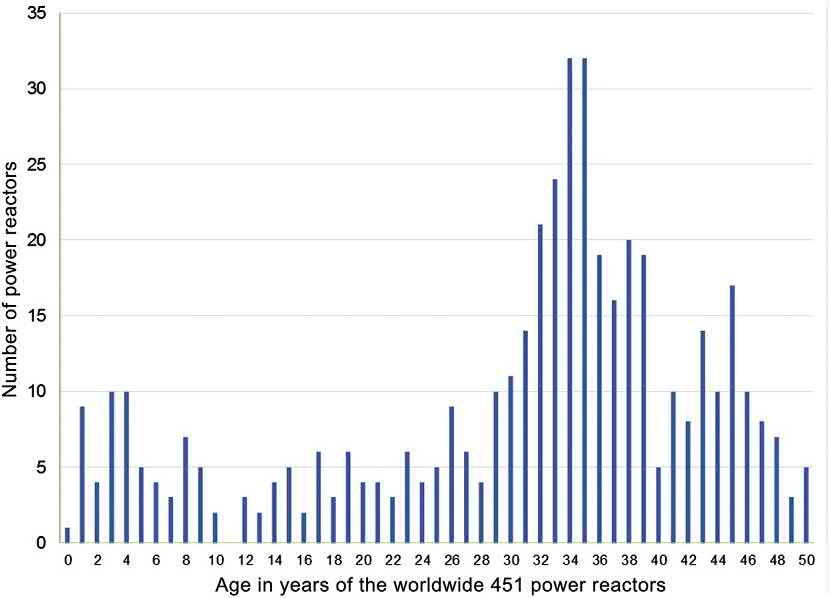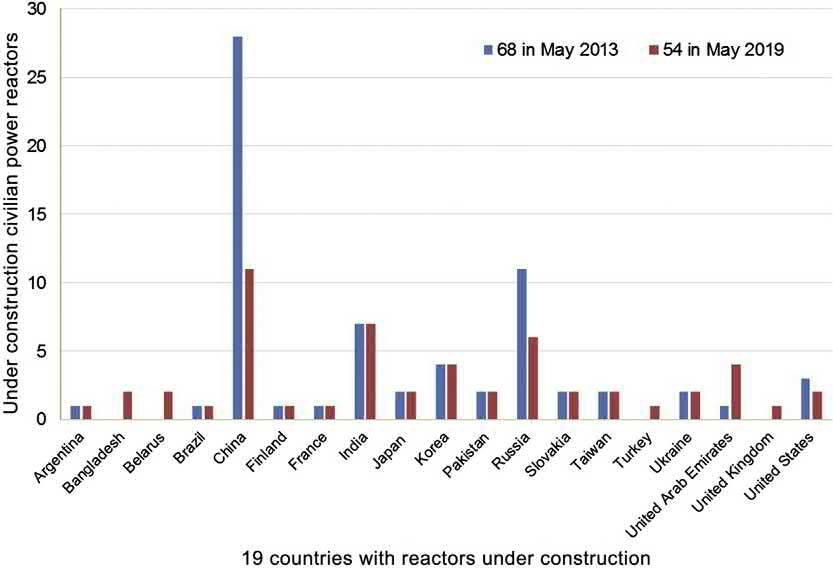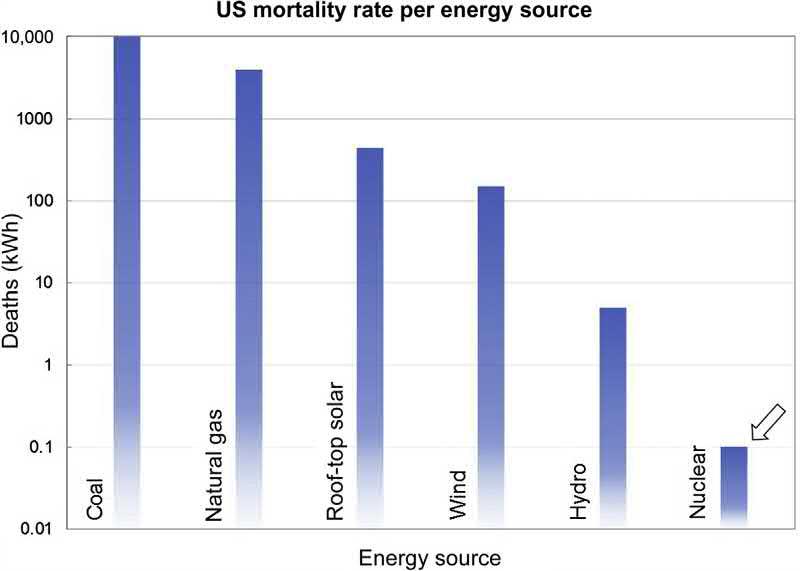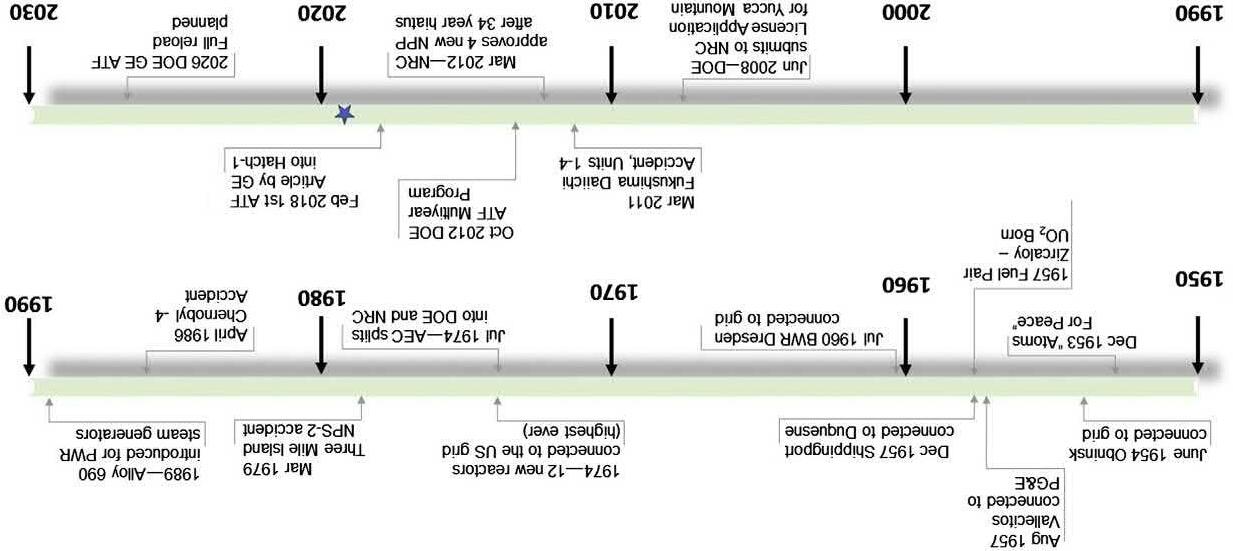Accident-Tolerant MaterialsforLight WaterReactorFuels
RaulB.Rebak
GeneralElectricResearch,Schenectady,NY,UnitedStates
Elsevier
Radarweg29,POBox211,1000AEAmsterdam,Netherlands
TheBoulevard,LangfordLane,Kidlington,OxfordOX51GB,UnitedKingdom 50HampshireStreet,5thFloor,Cambridge,MA02139,UnitedStates
Copyright©2020ElsevierInc.Allrightsreserved.
Nopartofthispublicationmaybereproducedortransmittedinanyformorbyanymeans, electronicormechanical,includingphotocopying,recording,oranyinformationstorageand retrievalsystem,withoutpermissioninwritingfromthepublisher.Detailsonhowtoseek permission,furtherinformationaboutthePublisher’spermissionspoliciesandour arrangementswithorganizationssuchastheCopyrightClearanceCenterandtheCopyright LicensingAgency,canbefoundatourwebsite: www.elsevier.com/permissions.
Thisbookandtheindividualcontributionscontainedinitareprotectedundercopyrightbythe Publisher(otherthanasmaybenotedherein).
Notices
Knowledgeandbestpracticeinthisfieldareconstantlychanging.Asnewresearchand experiencebroadenourunderstanding,changesinresearchmethods,professionalpractices,or medicaltreatmentmaybecomenecessary.
Practitionersandresearchersmustalwaysrelyontheirownexperienceandknowledgein evaluatingandusinganyinformation,methods,compounds,orexperimentsdescribedherein. Inusingsuchinformationormethodstheyshouldbemindfuloftheirownsafetyandthesafety ofothers,includingpartiesforwhomtheyhaveaprofessionalresponsibility.
Tothefullestextentofthelaw,neitherthePublishernortheauthors,contributors,oreditors, assumeanyliabilityforanyinjuryand/ordamagetopersonsorpropertyasamatterof productsliability,negligenceorotherwise,orfromanyuseoroperationofanymethods, products,instructions,orideascontainedinthematerialherein.
BritishLibraryCataloguing-in-PublicationData
AcataloguerecordforthisbookisavailablefromtheBritishLibrary LibraryofCongressCataloging-in-PublicationData
AcatalogrecordforthisbookisavailablefromtheLibraryofCongress ISBN:978-0-12-817503-3
ForInformationonallElsevierpublications visitourwebsiteat https://www.elsevier.com/books-and-journals
Publisher: MatthewDeans
AcquisitionEditor: ChristinaGifford
EditorialProjectManager: JoshuaMearns
ProductionProjectManager: R.VijayBharath
CoverDesigner: MatthewLimbert
TypesetbyMPSLimited,Chennai,India
ResistanceofmonolithicFeCrAlcladdingtothermalshock
InteractionbetweentheuraniafuelandtheFeCrAlcladding
OxidationresistanceofFeCrAlinhigh-temperaturegas
Normaloperationoxidationtoaccidentoxidationscenarioand viceversa124
Scenario1:Water-oxidizedAPMTtubesexposedtosuperheated
Scenario2:Steam-oxidizedAPMTtubesexposedto high-temperaturewater
8.Maturityoftheaccident-tolerantfuelconcepts:
Preface
Theaimofthisbookistoprovideasnapshotonthestate-of-the-artdevelopmentofafamilyofmaterialscalledaccidenttolerantfuels(ATF)forcommerciallightwaterreactors.Thesematerialsincludeadvancedcladding componentsandfuelforms.Thisbookisnotmeanttobeacomprehensive orexhaustivecollectionofdataorinformationonmaterialsforcivilian nuclearpowergenerationsinceitsstatusiscontinuouslychanging,practicallyonaweeklybasis.Adescriptionisprovidedonhowtheenthusiasmof thecurrentdevelopmentofnewerinnovativematerialsstartedaftersixdecadesofstagnationorcomplacencyinthenuclearindustry.Thebookis intendedforgraduatestudentsornewprofessionalswhoaregettingstarted inthefield;sotheycanputthingsinperspectiveandunderstandhowwe reached2019,theyearofATF.
TheconceptofATFwasbornafterthe2011unfortunateeventsatthe FukushimaDaiichinuclearpowerstations.Initially,therewasastateofgreat concernthatthedestructivetsunamiwavenotonlywashedawaythediesel generatorsattheaffectedplants,butitalsosweptawaytheresolveofusing nuclearfissiontogeneratecivilianelectricity,especiallyinthewestern world.However,onlyafewmonthsafterthedisaster,thenuclearmaterials’ internationalcommunitywasabletorecoverfromthenegativereporting regardingtheexplosionsshownliveontelevisionworldwideandoffermaterialssolutionstoensurethattheeventsofFukushimawouldnotrepeatthemselves.Itwasabeautifulthingtowitnesshowgovernmentalfunding agencies,nuclearfuelvendors,regulatoryagencies,tradeorganizations,universityprofessors,reactorownerutilities,researchinstitutesscientists,and plantoperatorscameseamlesslytogethertooffersolutionsforthecontinuing useoflightwaterreactors.Theefforttolookforsolutionscametolifeat bothnationalandinternationallevels,andtherewas(is)agreatcontinuous cooperationbetweenalltheinvolvedparts.Thedevelopmentalprogramsare evolvingsoquicklythatalltheinitialschedulesarebeingbeaten.Thereis alsosuchanagilityintheexecutionoftheprogramsthatmanyinitialideas notdeemedviableoffastimplementationarebeingshedquicklyand researchersarejoiningforcesonthegrowthoftheremainingmorerobust concepts.Therefore,thefocusofthisbookistodescribeandassessthetechnologyreadinesslevelofonlythefewstrongestideasratherthantomeander tryingtocoverallearlyproposedideasthatmaybefarawayfromfruition.
Initialchapterssuccinctlydescribethehistoryandevolutionofnuclear energyasasourceofcivilianelectricity,praisingthematerialsthatwere abletomakepossibletheexistenceofnuclearpowerforalmostsevendecades.Themaingoalofthemoretechnicalchapterswastoreviewtheliteraturedatausingthesamesetofguidelines,metrics,orparameterstoevaluate thematurityofeachconceptandtoassesstheprogressorimportantgaps thatexistineachoftheengineeringanswerstothenewermaterialschallenge.Thisbookdoesnotcovereffortsandresultsfromthefieldofmodelingandsimulation.Ineachoneoftheproposedsolutionsthereisasolid foundationofsciencejustifyingtheviabilityofeachconcept,butforautility tobeabletoimplementtheproposedaccidenttolerantfuel,italsoneedsto besimple,practical,economical,andsafe.
Itisanexcitingtimetobeworkinginthefieldofadvancedtechnology materialsformakinglightwaterreactorssafertooperate.Theuseofelectricityoriginatingfromnuclearsourcesrepresentsacrucialcontributiontoa cleanenvironmentandtothereductionintheatmosphericreleaseof climate-changinggreenhousegases.
Finally,Iwouldliketoacknowledgethepatienceandunderstandingof myhusbandWilliamW.Wickline,whomakesmelaughandwhoprefersto ignorethetravailsoftherealworldbywatchingvintageHollywoodmovies.
RaulB.Rebak Schenectady,NewYork,May15,2019 x Preface
Listofabbreviations andacronyms
ANL ArgonneNationalLaboratory(UnitedStates)
AOOs Anticipatedoperationaloccurrences
ATF Accident-tolerantfueloradvancedtechnologyfuel
ATR Advancedtestreactor
BDBAs Beyond-design-basisaccidents
BNL BrookhavenNationalLaboratory(UnitedStates)
BWR Boilingwaterreactor
CANDU CanadaDeuteriumUranium
CA-PVD Cathodearcphysicalvapordeposition
CEA FrenchAlternativeEnergiesandAtomicEnergyCommission
CHF Criticalheatflux
CILC Crud-inducedlocalizedcorrosion
CMC Ceramicmatrixcomposite(SiC/SiC)
CNL CanadianNuclearLaboratories
CRIEPI CentralResearchInstituteofElectricPowerIndustry(Japan)
CTE Coefficientofthermalexpansion
CVD Chemicalvapordeposition
CVI Chemicalvaporinfiltration
DBA Design-basisaccident
DNB Departurefromnucleateboiling
DOE DepartmentofEnergy(UnitedStates)
EATF Enhancedaccident-tolerantfuel
EBSD Electronbackscatterdiffraction
ECCS Emergencycorecoolingsystem
ECR Equivalent-claddingreacted
EDF Electricite ´ deFrance
EDS Energydispersivespectroscopy
EGATFL ExpertGrouponAccident-TolerantFuelsforLightWaterReactors(NEA)
EPR Europeanpressurizedreactor
EPRI ElectricPowerResearchInstitute
ETF Elongationtofailure
HFIR High-fluxisotopereactor
HWC Hydrogenwaterchemistry
IAEA InternationalAtomicEnergyAgency
IMAGO IrradiationofMaterialsforAccident-tolerantfuelsintheGosgenreactor
INL IdahoNationalLaboratory(UnitedStates)
xii Listofabbreviationsandacronyms
IRSN Institutderadioprotectionetdesu ˆ rete ´ nucle ´ aire(France)
JAEA JapanAtomicEnergyAgency
KAERI KoreaAtomicEnergyResearchInstitute
KIT KarlsruheInstituteofTechnology(Germany)
KTH RoyalInstituteofTechnology(Sweden)
LBM Laserbeamwelding
LFA Leadfuelassembly
LFR Leadfuelrods
LHGR Linearheatgenerationrate
LOCA Loss-of-coolantaccident
LTA Leadtestassemblies
LTR Leadtestrod
LWR Lightwaterreactor
METI MinistryofEconomy,TradeandIndustry(Japan)
NDE Nondestructiveevaluation
NEA NuclearEnergyAgency
NEAMS Nuclearenergyadvancedmodelingandsimulation
NFD NipponNuclearFuelDevelopment
NPP Nuclearpowerplant
NPS Nuclearpowerstation
NRC NuclearRegulatoryCommission(UnitedStates)
NWC Normalwaterchemistry
OD Outerdiameter
ODS Oxidedispersionstrengthened
ORNL OakRidgeNationalLaboratory(UnitedStates)
PCI Pellet cladinteraction
PCMI Pellet cladmechanicalinteraction
PIE Postirradiationexamination
PNNL PacificNorthwestNationalLaboratory(UnitedStates)
PRW Pressureresistancewelding
PSI PaulScherrerInstitute(Switzerland)
PVD Physicalvapordeposition
PWR Pressurizedwaterreactor
RBMK HighPowerChannel-TypeReactor(Russia)
RCS Reactorcoolantsystem
RE Rare-earthelements
RIA Reactivity-initiatedaccident
RPV Reactorpressurevessel
RT Roomtemperature
SBO Stationblackout
SCC Stresscorrosioncracking
SEM Scanningelectronmicroscopy
TD Theoreticaldensity
TIG Tungsteninertgas
TREAT Transientreactortestfacility
TRISO Tri-structuralIsotropic
TRL Technologyreadinesslevel
UTS Ultimatetensilestrength
VHT Veryhightemperature
VVER Water waterenergeticreactor(Russia)
XRD X-raydiffraction
YS Yieldstress
Nuclearpoweriscleanandsafe
ChapterOutline
Overview1
Thefirststepsofcommercialnuclear power8
Overview
Theelectricityintheinterconnectedcommercialgridcomesfrommany sourcesincludingfossilfuels,renewableenergies(e.g.,solarandwind),and nuclearenergy.Theenergyharvestedfromnuclearfissionsourcesisclean, itdoesnotreleasegreenhousegasestotheenvironment,anditdoesnotcontributetoclimatechange.Moreover,nuclearsourcedelectricityisthesafest typeforcivilianuse.IntheUnitedStatesandaroundtheglobe,thenumber ofhumandeathsperkilowatthourofgeneratedelectricityfromnuclear sourcesisfiveordersofmagnitudelowerthanforcoalandotherhydrocarbonsources.Nuclearelectricityisevensaferthansolarorwindelectricity.
Nuclearpowerwasfirstusedformilitarypurposes,especiallyforthepropulsionofsubmarines.However,intheearly1950s,theUnitedNationsprogramofAtomsforPeace,boththeUnitedStatesandtheSovietUnion developedtheirfirstciviliannuclearpowerplantswhichwereconnectedto theirrespectivegridsinthelate1950s.Ataroundthistime,thetrustedfuel rodpairofzirconiumalloycladdingcontainingpelletsofuraniafuelwas bornandusedformanydecadessince.Currently,thereareapproximately30 nationswhichuse451civilianreactorstogenerateelectricity.Thelargest expansionofnuclearreactorswasinthedecadesof1970sand1980s.In 2019therewere54newreactorsunderconstruction,mainlyinAsia.
Introduction
Cleanenergyisanenergythatdoesnotpollutetheenvironmentnor increasestheamountofgreenhousegasesthatmaycontributetoclimate change.Nuclearenergyiscleanenergysinceitdoesnotchangethecarbon footprintintheplanet.Nuclearenergyisalsothesafestformofallenergies
2 Accident-TolerantMaterialsforLightWaterReactorFuels
usedtogenerateelectricity.Nuclearenergyisevensaferthantherenewable solarorwindenergies.Electricitygeneratedusingfossilfuelsmayincrease thecarbonfootprintbyreleasingmethanegastotheatmosphereinthe upstream(duringexplorationandproduction)andthenreleasingcarbon dioxidetotheatmosphereinthedownstreamwhenthefossilfuelsorhydrocarbonsareburnttoextracttheheat.
SteamturbinesgeneratemostoftheelectricityusedintheUnitedStates andintheplanet.Powerplantsthatarefedbyuraniumorcoalaresimilarin thesensethatbothusesteamturbinestomovethegeneratorstoproduce electricity.Nuclearandcoalplantsdifferinthewayhowtheymaketheir steamneededfortheturbines.Onetypeofplantsplitstheatomthrougha fissionreactionwhichgeneratesvastamountsofenergy,andtheothertype ofpowerplantburnshydrocarbonsthroughacombustionreaction.Overall, theoperationofbothtypesofplantsgreatlydiffersinthefactthatoneplant producessteaminthesafestandcleanestwaypossiblewhiletheotherdoes not.
Worldwide,thegenerationofelectricpowerhasseveralsourcesof energythatcanbegroupedas:(1)fossilfuels(coal,petroleum,andnatural gas),(2)nuclear,and(3)renewable(wind,solar,hydroelectric,geothermal, biomass,etc.)sources. Fig.1.1 showsthattheworldenergyconsumptionin thenexttwodecadeswillbestilldominated(B80%)bytheburningoffossil fuels(liquid,gas,andcoal).Nuclearenergyrepresentsonly6%oftheenergy consumedworldwide.IntheUnitedStates,30%oftheconsumednaturalgas isusedtogenerateabout20%oftheelectricalpowerproducedinthecountry.Theother70%oftheconsumednaturalgasisusedforpurposesother thantogenerateelectricity,forexample,forheating.Onthecontrary,100% ofthenuclearenergygeneratedisusedtoproduceelectricity.
Nuclearoratomicenergyisreleasedwhenatomsaresplitinareactor. Thereleaseofnuclearfissionenergyistransferredtowater,whichmakes
FIGURE1.1 Worldenergyconsumption.
Operationalpowerreactors(IAEA,2019).
steamthatisusedtospintheturbineswhichrotatestheshaftoranelectrical generator.Electricitygeneratedusingnuclearsourcesrepresentsabout20% ofalltheelectricalpowerconsumedintheUnitedStates.Inothercountries, suchasFrance,theelectricitygeneratedfromnuclearfissionrepresentsover 70%ofthetotalelectricityconsumedinthenation.Therearecurrently around30countriesintheglobethatusenuclearsourcestogeneratecivilian electricity(IAEA,2019).
Fig.1.2 showsthattheworldwidenumberofoperationalreactorsslightly increasedbetween2013and2019from430to446(IAEA,2019).ThelargestincreaseinnewerpowerreactorswasinAsiaandEasternEurope(China, Korea,India,Pakistan,andRussia).ThenotableincreasewasinChinawhere thenumberofreactorsmorethandoubledfrom18in2013to46in2019.In thewesternworld,thenumberofoperationalreactorsmostlydecreased, exceptforArgentinawhereitincreasedfromtwotothree.
Fig.1.3 showsthenuclearpowerpercentageofthetotalelectricityconsumedinthe30currentcountrieswithnuclearpowerfor2013and2019 (IAEA,2019).Thecountrieswiththelargestshareofnuclearpowerare France,Slovakia,Ukraine,Belgium,andHungary.Franceisalsoexporting electricitytoneighboringcountriessincetheircostofpowergenerationis lowcomparedtoothernonnuclearsourcesinthoseneighboringcountries. Therewaslittlechangebetweentheshareofnuclearpowerbetween2013 and2019forthe30countrieslisted.IntheUnitedStates,forexample,the shareofnuclearpowerstayedthesameat20%betweenthese2years,consideringthatthecountryhadfourfewerreactorsin2019thanin2013.One
FIGURE1.2
4 Accident-TolerantMaterialsforLightWaterReactorFuels
ofthereasonsisthatthepowerreactorsbecamemoreefficientandanother reasonisbecausethetotalconsumptionofelectricitydecreasedduetheenvironmentalgreenmeasures.
Fig.1.2 showsthatJapanhadapproximately40operationalreactors between2013and2019buttheshareofnuclearpowerwasonlyintheorder of3%.ThereasonforthisisthatmostoftheJapanesereactorswerenotproducingelectricityinthisperiodbecauseoftheirtemporaryshutdownfollowingtheFukushimaaccidentofMarch2011.Beforetheaccidentatthe Fukushimasite,thenuclearpowershareinJapanwasapproximately30% (IAEA,2019).
Fig.1.4 showstheagedistributionofthe451powerreactorsoperating worldwideinMay2019(IAEA,2019).Sixty-eightpercentofthereactors are30ormoreyearsoldandonly13%ofthereactorshaveanageof10 yearsorless.Theworldwidefleetofpowerreactorsisaging,butitalso appearsthatthereisaslightincreaseinthenumberofreactorswith5years orlessinage.Itisimportanttopreventtheshutdownofolderreactorsby licenserenewal.Oneofthemeasurestopreventtheshutdownofolderreactorsistoretrofitthemusingaccidenttolerantfuels,whichwillmakethe reactorssafertooperate.
IntheUnitedStates,therearecurrently98operatingcommerciallight waterpowerreactors,34boilingwaterreactors(BWRs),and64pressurized waterreactors(PWRs).Approximately90%oftheUSpowerreactorsareat least30yearsoldand45%ofthereactorsareatleast40yearsold.Onlyone
FIGURE1.3 Nuclearpowershare(IAEA,2019).
FIGURE1.4 Agepowerreactors.
newreactorwasconnectedtothegridintheUnitedStates,inthelast25 yearsandonlytwonewreactorsarecurrentlyunderconstruction(2019).
Fig.1.5 showsthat19countrieshavecurrentlypowerreactorsunderconstructionascomparedto15countriesin2013.Fourcountries(Bangladesh, Belarus,Turkey,andUnitedArabEmirates)thatdidnothavenuclearpower beforearecurrentlyplanningtoentertheinternationalcommunityofgeneratingelectricityfromnuclearenergy(IAEA,2019).China,India,andRussia havecurrentlythelargestamountofnuclearpowerplantsunderconstruction, eventhoughtheconstructionrateinChinaseemedtohavesloweddownin thelastquinquennium.TheUnitedArabEmirateshasfourreactorsunder constructionwhichismorethandoublethanitwasin2013.Itislikelythat EgyptwillfollowsoonwithapowerreactoroftheirownintheArabcommunity.Egypthashadanuclearprogramsince1954.Therearealsocurrent advocacygroupstobringnuclearpowertoAustralia,consideringthat Australiahasmorethan30%oftheworlddepositsinuranium,similartothe depositsofCanadaandKazakhstan.
Benefitsofnuclearenergy
Nuclearpowerplantsworkallthetime,andtheydonotneedspecificclimaticconditionstooperate.Nuclearenergyprotectstheenvironmentsinceit doesnotreleasenitrogenoxide,sulfuroxide,orcarbondioxide.The
Accident-TolerantMaterialsforLightWaterReactorFuels
FIGURE1.5 Reactorsunderconstruction.
FIGURE1.6 Casualtiesperkilowatthour(kWh).
productionofnuclearelectricitydoesnotgenerateparticulatesorspread mercuryanditdoesnotcontributetothereleaseofmethanetotheatmosphere.Nuclearenergyisalsothesafesttypeofenergysinceithistorically
producedthelowestnumberofcasualtiesorfatalitiesperkilowatthourof energygenerated(Fig.1.6).Thelargestnumberofhumancasualtiesaround theworldbecauseofgeneratingelectricityiscausedbyairpollution,more specificallybythepresenceoffineparticulatematter( , 2.5 µmdiameter)in theatmosphere.Thefinesuspendedparticulatematter,whichoriginates mainlythroughtheburningofcoal,maycausemorethan2milliondeathsa yearmainlyintheformofcardiopulmonarydiseasesandlungcancer(Silva etal.,2013).MostoftheseannualprematuredeathsareinAsia(India, SoutheastandEastAsia)(Silvaetal.,2013).
Fig.1.6 showsthemortalityrateintheUnitedStatesperkilowatthourof electricitygeneratedaccordingtofivesourcesofenergy.Thehumanfatalities causedbytheburningofcoalarefiveordersofmagnitudehigherthanthe fatalitiescausedbynuclearpower.Majoraccidentscausingimmediatedeaths andrelatedtotheproductionofelectricityincludethecollapseofdams (hydroelectricity),coalminingaccidents,andtheruptureofpipelinesfollowedbyexplosions.Forexample, theruptureoftheShimantanDamin 1975producedmorethe170,000humanf atalities.Coalminingaccidents producedalmost5000immediatedeath sin2006inChinaalone.Moreover, inChina,morethan70,000minersayearsufferfromtheblacklungdisease (pneumoconiosis).IntheUnitedStates,thefatalitiesincoalmineswerein theorderof1500peryearuntilthe1970s,whicheventuallydeclinedtoless than100peryearbetween1990and2012.Incontrast,intheUnitedStates, therewerezerofatalitiesrelatedtotheproductionofelectricityfromnuclear sources.
Whydoesnuclearpowerstillhaveamixedsupportinthepublic?Itis mainlybecausenuclearenergyiscomplexandnontransparent.Thegenerationofcivilianpowerusingnuclearenergyhasanunprecedentedandunparalleledsafetyrecord.Itsimplementationfollowsstrictlicensingprocedures andregulationsandthenuclearpowerplantsareoperatedandmaintainedby highlytrainedprofessionals.Onlythreemajoraccidentsarerelatedtothe productionofcommercialelectricityfromnuclearfissionsourcesandare describedin Table1.1.TheaccidentthatcausedthelargestnumberofcasualtieswasinUkrainebytheChernobylReactorNumber4.Approximately 30firstresponders’firefightersdiedduringorimmediatelyafterthe Chernobylaccidentanditisestimatedthatthehumancasualtiesmayhave reachedseveralthousandsinthethreedecadessincetheaccident,mainly becauseofcancer.Bycontrast,theaccidentofThreeMileIslandhadzero immediateandlong-termcasualties.TheFukushimaaccidentsitssomewhere inthemiddle.TheonlycasualtiesattheFukushimasiteduringthetsunami andtheimmediateeventswereduetothedrowningoftwotechnicianswho wereinthebasementwhenthesecondwavehittheturbinebuildings. RelatedprematurecasualtiesbecauseoftheFukushimaaccidentemanated fromtheevacuationofelderlyandailingresidentsfromnearthepower
8 Accident-TolerantMaterialsforLightWaterReactorFuels
TABLE1.1 Commercialnuclearaccidents.
Commercial nuclear accident
ThreeMile Island,1979
Chernobyl, 1986
Whathappened?Directhumancasualties (delayed,estimated)
PartialmeltdownofthePWRUnit2 reactorduetoalossofcoolantinthe primarycircuitcausedbyavalve stuckopen.Cause,humanerror,& lackoftraining.
Steamexplosionfollowedbyopen airgraphitefireofthelightwater graphitemoderatedRBMKUnit4 reactorduringatesttosimulatea stationblackout.Thefireburnedfor 9daysreleasingfissionproductsto theatmosphere.Cause,operator error,negligence,&lackoftraining orknowledge.
0(0)
30(134upto1996, maybeatotalof4000, leukemiaandcancer)
Fukushima Daiichi,2011
Hydrogengasexplosionsbecauseof lossofcoolantduetostationblack outcausedbyatsunamiwave. Releaseofradioactiveproductsto theatmospherefromBWRUnits1, 2,and3.Cause,failureofoperator tomeetbasicsafetyrequirements.
2drowned(1600elderly relatedtoevacuation,not toradiation)
BWR,Boilingwaterreactor; PWR,pressurizedwaterreactor; RBMK comesfrom“ReaktorBolshoy MoshchnostiKanalnyy”whichmeans“HighPowerChannel-typeReactor”.
station.CasualtiesduetoirradiationexposureintheFukushimaPrefecture maynotbeprovenyet.
Thefirststepsofcommercialnuclearpower
CiviliannuclearpowerwasdevelopedalmostsimultaneouslyintheUSSR andintheUnitedStatesinthemidtolate1950s. Fig.1.7 showsafewmilestonesofnuclearpowerfrom1950,mostlycenteredaroundeventsinthe UnitedStates.Theutilizationofnuclearenergytogenerateelectricityoriginatedfromthediscoveryofthenuclearfission(andthereleaseofheat)in December1938inGermany.Thecontrolledreleaseofnuclearenergybya self-sustainingchainreactionwasrealizedbyEnricoFermiattheUniversity ofChicagoinDecember1942.CriticalitywasreachedintheFermibuiltpile reactorwithnaturaluranium.Areactorachievescriticalityandbecomescritical,wheneachfissioneventreleasesenoughneutronstosustainanongoing
Nuclearpowertimeline.
FIGURE1.7
10 Accident-TolerantMaterialsforLightWaterReactorFuels
seriesofreactions,producingacontinuousreleaseofheat.Approximately 99%ofthenaturaluraniumistheuranium-238(U-238)isotopewhichis nonfissile.Thenaturaluraniumalsocontainsapproximately0.7%ofthefissileU-235isotope.AftertheFermisustainedchainreactiondemonstration, effortswereundertakenattheClintonEngineerWorksatOakRidgeto enrichtheuraniumfuelintheU-235isotopefromapproximately0.7%to levelsintheorderof3% 5%.Theearly1940seffortsandactionstoharvest energyfromnuclearfissionwereacceleratedasaresponsetotheWorldWar IIeventsinEurope.
TheuseofnuclearfissionenergytoproduceelectricityintheUnited Stateswasmainlytheresultofthelaborsofoneperson,HymanGeorge Rickover.RickoverwasanofficerintheUSNavyandafterspendingtime duringWorldWarIIinthePhilippinesandJapan,hereturnedtotheUnited Statesanddecidedtoreinventhisowncareerbydedicatinghimselftolearn howtousenuclearenergytopropelasubmarine.Between1946and1947, RickoverspentayearatOakRidgetolearnasmuchashecouldabout nuclearenergyandthenhereturnedtoWashington,DC,tobethedirectorof reactordevelopmentinthenewlycreated(1946)AtomicEnergy Commission.Rickover’smainobjectivewastobuildareactorforasubmarinebutbecauseofpoliticalbacklash,theUSpoliticalsystemdecidedto demonstrateintheearly1950sthatnuclearenergycouldbeusedforpeacefulpurposes,suchasgeneratingelectricityfortheciviliandistributiongrid.
Thefirstpressurizedlightwatercooledpowerreactortobeconnectedto theelectricalgridandtooperatecommerciallywastheatomicpowerstation 1(APS-1)atObninsk,USSR,onJune27,1954(Simnad,1981).The Obninskreactoralsoservedasaresearchstationforseveraldecadesuntilit wasdecommissionedin2002.Researchanddevelopmentconductedatthe ObninskpowerstationhelpedinthedesignandimprovementoftheRBMK sovietpowerreactor,atypeofpowerreactorwhichisstillinusetoday. AfteranRBMKtypereactorsufferedtheaccidentinChernobylinUkraine inApril1986,theexistingoperatingRBMKreactorsweremodifiedandretrofittedtomakethemmoreresilienttoaccidents.TheRBMKdesignissimple,ituseslightwaterforcoolant,graphitewithboroncarbideforcontrol rods,andzirconium niobiumcladdingfor2%enricheduranium235inuraniafuel.
Asmentionedearlier,thefirstwesternproductionofelectricitybyways ofharvestingnuclearfissionenergywasapoliticalmovebytheUnited Statestofulfillthegoalofpeacefulusesofatomicenergy,asafollow-upof theDecember8,1953,“AtomsforPeace”speechbytheUSPresident DwightD.EisenhowerdeliveredattheUnitedNationsGeneralAssembly.A PWRthatwasunderconstructionintheearly1950sattheWestinghouseoperatedBettisLaboratories(nearPittsburgh)foranaircraftcarrierwas repurposedtobeusedfortheciviliangenerationofelectricity.TheUS AtomicEnergyCommissionpartneredwiththeWestinghouseCoandthe
DuquesneLightCompanytotakethisfirstcivilianpowerreactortocompletion(Lustman,1981;VanDuysenandMericdeBellefon,2017).ThelocationforthisfirstcivilianreactorwasShippingportinBeaverCountyonthe OhioRiverapproximately40kmsouthofPittsburgh.Theresponsibilityof theconstructionofthereactorwasgiventoRearAdmiralH.G.Rickover, DirectoroftheAtomicEnergyCommissionDivisionofNavalReactors.The constructioncompanyfortheShippingportreactorwasWestinghouseand theutilitythatwasgoingtoparticipateintheconstructionandlaterdistribute theelectricitywastheDuquesneLightCompany.ThegroundbreakingceremonyfortheciviliannuclearpowerstationonShippingportwason September6,1954(Karoutasetal.,2018).Thenuclearpowerstationreached criticality3yearslater,onDecember2,1957(Fig.1.7).Thefirstelectricity fromthisplantarrivedattheelectricgridonDecember18,1957,andthe plantgeneratedelectricityuntilitwaspermanentlyshutdownin1982.The objectivebytheUSAtomicEnergyCommissionintheearly1950swasto haveapublicutilityrunanuclearpowerreactorbeforetheSecondUnited NationsInternationalConferenceonthePeacefulUsesofAtomicEnergyin GenevaSeptember1 13,1958(UnitedNations,1958;Lustman,1981).As inthecaseoftheObninskpowerplantintheUSSR,Shippingportwasbuilt toserveadualpurpose,notonlyasapowergeneratorforthegrid,butalso asatestfacilityfortheadvancementofnuclearpowertechnology.
ThereactoratShippingportwasaPWRbasedonpreviousdesignsmade fortheUSNavynuclearsubmarinessuchastheMark1prototypebuiltin IdahoandthesecondcomparablereactorbuiltfortheNautilussubmarine (Lustman,1981;VanDuysenandMericdeBellefon,2017).ThefirstsubmarinetypePWRcalledS1Wwasbuiltonlandanditachievedcriticalityon March30,1953.ThesecondPWRwasinstalledintheNautilussubmarine andcommissionedonSeptember30,1954.Twoengineeringandmaterial issueshadtoberesolvedatthattime:(1)whattouseforthefueland(2) whattouseforthecladdingofthefuelinthereactors.ThecorrosionbehaviorofnuclearcandidatematerialsintheUnitedStatesintheearlier1950s wascharacterizedbyurgencyandsecrecy(WanklynandJones,1962). Remarkably,inthemidtolate1950s,thebasicphenomenaoftheoxidation ofZircaloy-2inair,waterandsteamwerealreadyratherwelltestedandrecognized.Then,thedecisionwasmadethatShippingportwasgoingtouse Zircaloy-2ascladdingforthefuelbasedonthepositiveresultsfromtheprevioustwobuiltreactors,thelandbasedinIdahoandtheNautilusone,even thoughZircaloywasveryexpensiveatthattimesincetheKrollproduction processwasnotoptimizedyet.Also,atthetimeofthefabricationofthe ShippingportreactoratBettis,theonlyknownfuelwasmetallicuranium, sometimesminimallyalloyedtocontrolgrainsize(Lustman,1981). Compatibilitystudiesofmetallicuraniumwithhotwaterthatmaycomein contactviacladdingdefectswerenotoptimistic.When9% 12%ofmolybdenumwasaddedtotheuraniummetal,theresearchersachievedthegamma
12 Accident-TolerantMaterialsforLightWaterReactorFuels
orface-centeredcubic-phasestabilizationoftheuraniummetalanda decreaseofseveralordersofmagnitudeinthecorrosionrateofmetallic uraniuminhotwater.ItwasalsobelievedthatMoadditionswouldlimit swellingduringirradiation(Lustman,1981).Ataroundthesametimeinthe mid-1950s,Glatter,aBettisceramist,waspushingfortheconsiderationof urania(UO2)forthefuelinthethreereactorsbuiltorunderconstructionin theUnitedStates(Lustman,1981).Oneofthemainissuesthatmanyresisted ontheimplementationofuraniaasfuelwasitspoorthermalconductivity. Highthermalconductivityisneededtoremovetheheatquicklyfromthe fuel,viathecladdingandintothecoolantwater.Nevertheless,uraniawas consideredattractivebecauseofitsresistancetointeractionwithwaterinthe caseofacladdingbreachandbecauseofitsresistancetoirradiationdamage (AngandBurkhammer,1960).Eventuallyinthe1950s,aftermanyfabricationandperformancetrials,themanufacturingofuraniawasdeemedareproducible,controllable,andpredictableprocess(Lustman,1981).Thereforein thelate1950s,thecoupleorpairofuraniafuelandZircaloy-2claddingwas bornandadoptedeversinceformanydecadestocomeallovertheworld (Fig.1.7)(Lustman,1981).Atthesametime,theUSNavyusedZircaloy claddingfortheuraniumdioxide(UO2)oruraniafuel,butintheearly 1960s,thecostofzirconiumwashighenoughthatmostofthecommercial nuclearpowerstationsbuiltintheUnitedStatesusedstainlesssteelsforthe claddingoftheuraniapellets(Simnad,1981).EventuallyasthecostofzirconiumstartedtodecreaseaftertheKrollproductionprocesswasoptimized, thecommercialplantsshiftedfromausteniticstainlesssteelssuchastype 304toZircaloy-2orZircaloy-4.
Thedesign,construction,andtestingofBWRs,withoutasecondloopto producesteam,wereexploredbothintheUnitedStatesandtheUSSRonthe mid-1950stoearly1960s(Simnad,1981).IntheUnitedStates,Argonne builtanexperimentalBWRwhichoperatedbetween1956and1967demonstratingthefeasibilityofanintegratedBWRplant.GeneralElectricbuiltthe VallecitosprototypeBWRwhichoperatedbetweenOctober1957and December1963.TheGEVallecitosreactorstartedoperation4monthsbefore theWestinghouseShippingportinPennsylvania(Fig.1.7).Eventhough VallecitosgeneratedelectricityforthePacificGas&Electriccompanygrid, itspowercontributionwassmallenoughthatVallecitosisnotgenerally acceptedasthefirstUScivilianpowerreactor,therecordthatbelongsto Shippingport(VanDuysenandMericdeBellefon,2017).TheactualfirstUS civilianBWRwastheDresdenpowerstationdesignedbyGE,whichstarted operationsin1960inIllinois(VanDuysenandMericdeBellefon,2017). Dresdenwasthefirstreactordesignedandbuiltbyprivateinitiativeand withoutgovernmentassistance.MeanwhileintheUSSR,acoreofaBWR startedtestinginsidetheObninskAPS-1reactorin1954(Simnad,1981). ThefirstfullycommercialPWRintheUnitedStateswasYankee-Rowe powerstationinwesternMassachusetts,whichstartedoperationinJanuary
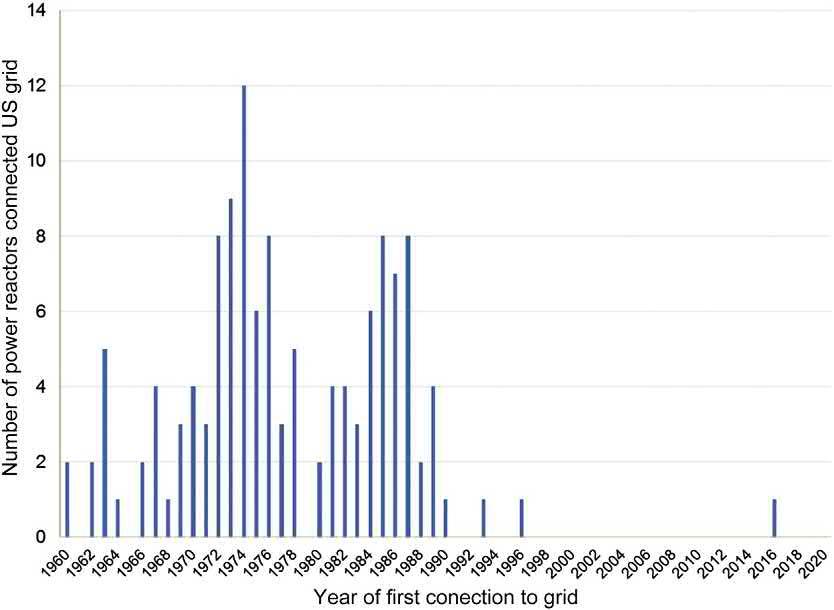
USreactorsfirstconnectedtogrid.
1961andendedinFebruary1992.InitiallythefuelintheYankee-Rowe PWRplantwasuraniapelletsandthecladdingwastype348austeniticstainlesssteel,withsomeelementshavingZircaloy-2cladding(Simnad,1981).
Figs.1.7and1.8 showthatthehighestnumberofpowerreactorsconnectedtotheUSgridwas12in1974(IAEA,2019). Fig.1.8 showsfora spanof60yearsthenumberofreactorsconnectedannuallytotheUSelectricalgrid.Mostofthereactorswereconnectedinthefirst30years (1960 90).Forthelast30years(1990 2019),onlyfournewreactorswere connectedtothegrid.Thelargestnumberofreactorswasconnectedinthe mid-1970sandlateragaininthemid-1980s.
TheVallecitosreactorinSunol(California)hadtheUSAtomicEnergy CommissionPowerReactorLicenseN 1.Vallecitoswasthefirstprivately ownedcommercialprototypeBWRownedbyGeneralElectric.Thisreactor initiallyusedaustenitictype304SScladdingforslightlyenrichedurania fuel.LatersomeofthecladdingwasreplacedusingZircaloy-2andZircaloy4(Simnad,1981).Eventually,someofthetype304SScladdingwasfound tosufferintergranularstresscorrosioncrackingfromthecoolantside,mainly becauseoftheradiolyticoxygen-containingenvironment(Terrani,2018). Thetype304SSusedinthe1960scontainedaconsiderableamountofcarbonandduringtheweldingoftheendcaps,theausteniticsteelwouldsensitize,makingtheweldseamareavulnerabletostresscorrosioncrackingfrom thecoolantside,mainlybecauseofthehighcorrosionpotentialinthewater
FIGURE1.8

